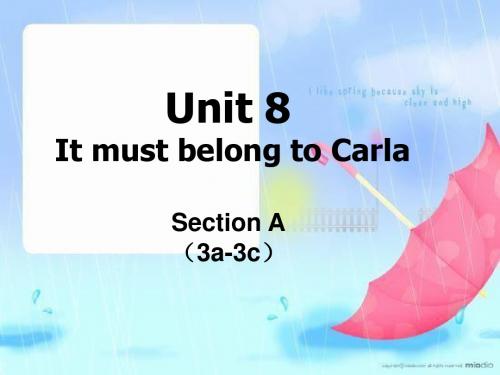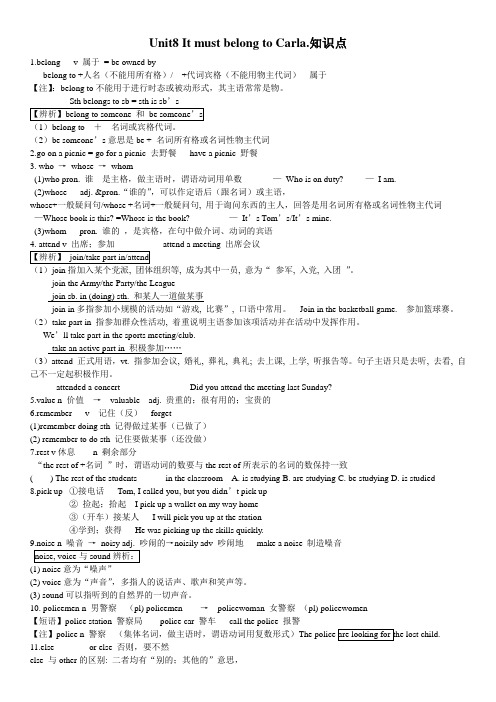人教版九年级英语Unit8It_must_belong_to_Carla..练习
人教版英语九年级上册 Unit 8 It must belong to Carla

单项选择
Exercises
1. — Whose dictionary is this?
— It _______ be Jack’s. His name is on it.
A. can
B. t
C. must
D. could
2. — Who is that girl reading under the tree over there?
A. might be
B. must be
C. can belong
D. might belong to
Homework
1. Preview the conversation in 2d. 2. Do the exercises in students’ book.
Unit 8 It must belong to Carla.
Whose shoes are these? They belong to …, because …
Whose sunglasses are these? It could belong to …, because …
Whose boots are these? They might belong to …, because …
— It _______ be Gina. I saw her in the classroom
just now.
A. mustn’t B. might not C. can’t
D. couldn’t
3. —Whose guitar is this?
— It _______ Lisa. She plays the guitar.
Read the chart and infer who these things belong to and why.
人教版英语九年级Unit8《ItmustbelongtoCarla.》全单元说课稿

人教版英语九年级Unit 8《It must belong to Carla.》全单元说课稿一. 教材分析人教版英语九年级Unit 8《It must belong to Carla.》全单元主要围绕“推理判断”这一主题展开。
通过本单元的学习,学生能够掌握一般现在时、一般过去时和一般将来时的被动语态,以及情态动词must的用法。
教材通过丰富的情境和真实的例子,帮助学生学会如何根据线索进行推理判断,并能在实际情境中运用所学知识进行交际。
二. 学情分析九年级的学生已经具备了一定的英语基础,能够理解和运用一般现在时、一般过去时和一般将来时的被动语态。
然而,学生在情态动词must的用法上可能还存在一定的困惑。
因此,在教学过程中,教师需要关注学生的实际情况,针对性地进行讲解和练习。
三. 说教学目标1.知识目标:学生能够掌握一般现在时、一般过去时和一般将来时的被动语态,理解情态动词must的用法。
2.能力目标:学生能够在实际情境中运用所学知识进行交际,提高推理判断能力。
3.情感目标:培养学生热爱生活,关心他人的品质。
四. 说教学重难点1.重点:一般现在时、一般过去时和一般将来时的被动语态,情态动词must的用法。
2.难点:情态动词must在实际情境中的运用。
五. 说教学方法与手段1.教学方法:采用情境教学法、交际法、任务型教学法等。
2.教学手段:多媒体课件、实物、图片、卡片等。
六. 说教学过程1.引入:通过展示一张照片,让学生猜测照片中的人是谁,引出本课主题。
2.呈现:展示教材图片,引导学生观察并找出图片中的线索,推理判断出物品的主人。
3.讲解:讲解一般现在时、一般过去时和一般将来时的被动语态,情态动词must的用法。
4.练习:学生分组进行角色扮演,运用所学知识进行交际。
5.巩固:学生完成教材练习题,检测所学知识。
6.拓展:引导学生运用所学知识,谈论现实生活中的人和事。
七. 说板书设计板书设计需突出本课重点内容,包括一般现在时、一般过去时和一般将来时的被动语态,以及情态动词must的用法。
人教版初中英语九年级全册Unit8ItmustbelongtoCarla.教学设计

一、教学目标
(一)知识与技能
在本章节的教学中,学生将通过学习Unit 8 “It must belong to Carla”,掌握以下知识与技能:
1.能够理解并运用本课所学的词汇和短语,如:belong to, everywhere, lose, find, wallet, key, glasses等,以提高学生的词汇量和语言表达能力。
3.结合自己的生活经历,以“Lost and Found”为主题,写一篇英语短文,分享自己在生活中丢失物品或帮助他人找回物品的经历,不少于80词。
4.观看与本节课主题相关的英语视频,如动画短片、教育节目等,提高英语听力水平,并尝试总结视频中的关键信息。
5.家长协助学生进行英语口语练习,模拟实际情境,运用所学知识进行角色扮演,鼓励学生在家庭环境中用英语进行沟通。
3.培养学生的人际交往能力,让他们学会用英语进行有效沟通,增进友谊。
4.培养学生的团队合作精神,使他们明白团队协作的重要性,共同完成任务。
5.激发学生对英语学习的兴趣,培养他们积极的学习态度,提高自信心。
二、学情分析
针对本章节的教学内容,结合学生的学习情况和认知发展水平,进行以下学情分析:
1.学生已经具备了一定的英语词汇和语法基础,能够理解和运用一般现在时态和一般过去时态。但在具体语境中,部分学生对时态的运用仍不够熟练,需要教师在教学中予以关注和指导。
3.家长要关注学生的学习进度,鼓励学生独立完成作业,培养自主学习能力。
4.教师在批改作业时,要关注学生的个体差异,给予针对性的指导和鼓励。
5.设计丰富的课堂活动,如角色扮演、小组讨论、听力训练等,让学生在轻松愉快的氛围中学习英语。
人教英语九年级Unit8ItmustbelongtoCarla语法精美

语法重点二
3. a woman with a camera 一个带有相机的妇女
英语里表达“有,没有”,可以用there be 句型, have 动词,介词with, without
there be 句型表 示“在……存在 有”。 如:There are 50
students in our
class.
第二课时(3A-4C)
语法重点一
1. However, these days, something unusual is happening in our town.然而,这些天在我们小 镇发生一些不平常的事情。
happen为不及物动词,意为“发生;碰巧”, 指事情的发生带有一定的偶然性或不能预料。
not only… but also 用于连接两 个表示并列关系的成分,着重强调后者,
其意为“不但…… 而且”;其中的also 有时可以省略。
如:She not only plays well, but also writes music. Not only men but also women were chosen. He works not only on weekdays but on Sundays as well.
如:The man is running after his son because he doesn’t want to do his homework.
类似的词组还有: read after 跟着读
如:Our teacher often asks us to read after him. 上句常也用单词follow来表达。 Our teacher often asks us to follow him to read.
人教版英语九年级Unit 8《It must belong to Carla.》全单元教学设计

人教版英语九年级Unit 8《It must belong to Carla.》全单元教学设计一. 教材分析人教版英语九年级Unit 8《It must belong to Carla.》主要围绕日常生活用品和衣物展开,通过描述物品的特征和归属关系,提高学生的听说读写能力。
本单元关键词有clothes, belong to, must, hr, glasses等。
对话内容涉及询问物品归属、描述人物特征等情境,旨在培养学生运用英语进行交际的能力。
二. 学情分析九年级的学生已具备一定的英语基础,能够听懂并运用日常生活中的基本词汇进行交流。
但部分学生对衣物类词汇的掌握尚不牢固,且在实际交际中,对于如何询问物品归属、描述人物特征等情境的运用还不够熟练。
三. 教学目标1.知识目标:–掌握关键词clothes, belong to, must, hr, glasses等。
–学会描述人物特征和物品归属的表达方式。
2.能力目标:–提高学生的听说读写能力,能在实际情境中运用所学知识进行交际。
3.情感目标:–培养学生热爱生活、关注身边事物的情感态度。
四. 教学重难点•关键词clothes, belong to, must, hr, glasses等的掌握。
•描述人物特征和物品归属的表达方式的运用。
•如何询问物品归属、描述人物特征等实际交际情境的运用。
五. 教学方法1.情境教学法:通过设定生活情境,让学生在实际语境中感知、理解和运用英语。
2.交际法:引导学生参与课堂互动,提高学生的口语表达能力和交际能力。
3.任务型教学法:通过完成具体任务,培养学生运用英语解决问题的能力。
六. 教学准备1.教师准备:–熟悉教材内容,明确教学目标。
–设计教学活动和任务。
2.学生准备:–预习相关词汇和对话内容。
–准备好日常衣物等物品,用于课堂展示。
七. 教学过程1.导入(5分钟)–教师与学生用英语进行自由交谈,营造轻松的课堂氛围。
–引导学生谈论自己喜欢的衣物,引出本课主题。
九年级人教英语第八单元Unit 8It must belong to Carla

Unit 8 It must belong to Carla.Section A1. 谁的 whose2. 卡车;货车 truck3. 野餐 picnic4. 兔;野兔 rabbit5. 出席;参加 attend6. 贵重的;很有用的;宝贵的valuable7. 粉红色的 粉红色 pink8. 任何人 nobody9. 事件;发生的事情(常指不寻常的)10. 声音;噪音 noise11. 男警察 policeman12. 狼 wolf13. 担心的;不安的 worried14. 实验室 laboratory15. 在户外;在野外 picnic16. 外套;外衣 coat17. 困倦的;瞌睡的 sleepy1. 属于某人 belong to sb.2. 听流行音乐 listen to pop music3. 参加一场音乐会 attend a concert4. 彼此 each other5. 一些有价值的东西 anything valuable6. 过去常常做某事 used to do sth.7. 一些不寻常的事情 something unusual8. 在社区制造恐怖 creat fear inthe neighborhood9. 感到不安 feel uneasy10. 被……采访 be interviewed11. 感到困倦 feel sleepy12. 离开;走开 go away13. 在野餐时 at the picnic14. 其余的……,剩余的…… the rest of15. 捡起 pick...up16. 发出噪音 make noise17. 在社区 inthe neighborhood18. 做某事有趣 have fun19. 洗澡 take a shower20. 有某人自己的想法 have one ’s own idea21. 听到浴室里水在流 hear water running in the bathroom22. 看到某人跑开 see sth. running away23. 不确定 be no sure1.你的书包里有什么贵重的物品吗?2.Do you have anything valuable in your schoolbag?3.我想一定有人捡到它了。
人教版九年级英语Unit8.-It-must-belong-to-Carla.SectionA(3a-3c)

3. However, these days, something unusual is happening in our town.
构成:不定代词+形容词 (定语后置)
e.g. something important 一些重要的事情
something interesting 一些有趣的事
un- 表示否定 usual 通常的 反义 unusual 不平常的
Free Talk
After reading the article, what do you think the strange noises are? Why?
1. It used to be very quiet.
used to do sth. 曾经,过去常常 (现在不做了)
be used to do sth. (=be used for doing
(2)、在may be中,may是情态动词,be是动 词原形,两者构成完整的谓语形式,与主语 形成系表结构,意为“也许是、可能是”。
I can’t find my watch. It may be in your pocket. 我找不到我的手表了,它可能在你的口袋 里。
He may be a soldier. 他可能是军人。
5….but I couldn’t see a dog or anything else, either.
too “也” 肯定句。句末。 also “也”肯定句。句中,
be后面,行为动词前。 either “也”否定句。句末。
e.g. She is a singer, too. 她也是个歌手。 He can also sing the English song. 他也可以唱英文歌。 If you don’t go to the park, he won’t go there, either. 如果你不去公园,他也不去。
新人教版unit8-it-must-belong-to-carla.课文知识点

Unit8 It must belong to Carla.知识点1.belong v 属于= be owned bybelong to +人名(不能用所有格)/ +代词宾格(不能用物主代词)属于【注】:belong to不能用于进行时态或被动形式,其主语常常是物。
(1)belong to+名词或宾格代词。
(2)be someone’s意思是be + 名词所有格或名词性物主代词2.go on a picnic = go for a picnic 去野餐have a picnic 野餐3. who →whose →whom(1)who pron. 谁是主格,做主语时,谓语动词用单数—Who is on duty? —I am.(2)whose adj. &pron.“谁的”,可以作定语后(跟名词)或主语,whose+一般疑问句/whose +名词+一般疑问句, 用于询问东西的主人,回答是用名词所有格或名词性物主代词—Whose book is this? =Whose is the book? —It’s Tom’s/It’s mine.(3)whom pron. 谁的,是宾格,在句中做介词、动词的宾语attend a meeting 出席会议(1)join指加入某个党派, 团体组织等, 成为其中一员, 意为“参军, 入党, 入团”。
join the Army/the Party/the Leaguejoin sb. in (doing) sth. 和某人一道做某事join in多指参加小规模的活动如“游戏, 比赛”, 口语中常用。
Join in the basketball game. 参加篮球赛。
(2)take part in 指参加群众性活动, 着重说明主语参加该项活动并在活动中发挥作用。
We’ll take part in the sports meeting/club.take an active part in 积极参加……(3)attend 正式用语,vt. 指参加会议, 婚礼, 葬礼, 典礼; 去上课, 上学, 听报告等。
- 1、下载文档前请自行甄别文档内容的完整性,平台不提供额外的编辑、内容补充、找答案等附加服务。
- 2、"仅部分预览"的文档,不可在线预览部分如存在完整性等问题,可反馈申请退款(可完整预览的文档不适用该条件!)。
- 3、如文档侵犯您的权益,请联系客服反馈,我们会尽快为您处理(人工客服工作时间:9:00-18:30)。
Unit 8It must belong to Carla.附详细参考答案第1课时(Section A 1a-3c)一、单词拼写。
请背诵词汇表,并默写单词。
名词:1.t________卡车;货车2.p________野餐3.r________兔;野兔4.h________事件;发生的事情(常指不寻常的)5.n________声音;噪音6.p________男警察7.w________狼动词:a________出席;参加形容词:1.v________贵重的;很有用的;宝贵的2.u________担心的;不安的代词:a________任何人兼类词:1.w________ adj.& pron.谁的2.p________ adj.粉红色的n.粉红色二、短语翻译。
请浏览教材,找出以下短语,并背诵之。
1.belong ________ sb.属于某人2.be ________担忧3.go to ________ ________去野炊4.the ________ of剩余的;其他的5.pick ________捡起;拾起6.________ to do/be过去经常7.be ________确信8.have ________ ________没主意;没想法9.go ________离开10.have ________ doing sth.做某事很有趣三、完成句子。
请仔细阅读教材,补充完整下列句子。
1.Do you have ________ ________ in your schoolbag?你书包里面有什么贵重的东西吗?2.At first, I thought that it ________ ________ a dog, but I couldn't see a dog, or anything ________,either.起先,我认为它也许是一条狗,但是我也没有看到狗或者别的东西。
3.There ________ ________ something ________ the homes in our neighborhood, but what is it?肯定有什么东西到访过我们附近的住宅,但它是什么呢?单项填空。
()1.Look! There is some paper on the ground.Let's ________.A.pick it up B.pick up itC.pick them up D.pick up them()2.—How do you go home tonight?—Oh, my father will ________.A.pick me up B.pick up meC.pick I up D.pick up I一、根据句意及首字母提示完成单词。
1.The t________ is carrying some wood on it.2.We are going to have a p________ at the beach next Sunday.3.Don't make any n________ in the reading room.4.I have a v________ ring.5.You shouldn't tell a________ about my secret.二、用所给单词的适当形式填空。
1.The ________ (write) is very famous.2.This book is ________ (value) for us to learn English.3.The ________ (policeman) were searching the forest for the lost kid.4.I________ (use) to be afraid of dark.5.She was sure of________ (finish) the work on time.三、单项填空。
()1.Mr.Green ________ the meeting and gave a report.A.attend B.attendingC.attended D.to attend()2.—________ English book is this?—Maybe it is Lucy's.A.Who B.WhoC.When D.Whose()3.We ________ rubbish in the park to keep it clean.A.pick up B.get upC.pick out D.look out()4.Yesterday something ________ happened.We didn't know what it was.A.unhappy B.uneasyC.unable D.unusual()5.Many things in the museum were ________ last week.A.steal B.stoleC.stolen D.stealing()6.It ________ be morning.Listen! The birds are singing.A.must B.mightC.could D.can't()7.The reporter was ________ last Monday.A.interview B.interviewingC.to interview D.interviewed()8.The children are having fun ________ on the playground.A.to play B.playC.playing D.played()9.Where ________ did you go during your holiday?A.other B.othersC.else D.the other()10.We often see Bob ________ ping-pong in the park.A.play B.to playC.playing D.played四、阅读理解。
My grandfather is eighty years old now.He always complains about how fast things have changed, and he often says that life used to be better.Families aren't families they used to be.A lot of families have broken up.If husband and wife have problems with their marriage, they no longer stay together.And mothers used to stay at home and take care of their children, but now not more.Everyone is busy working.Mothers used to spend all day cooking in the kitchen.But now the family don't eat home-cooked food any more.And the cars! No one walks any more.More and more people drive.Students used to walk 5 miles to school every day, even in winter.But nowadays students don't.And in school, children don't have to think any more.In math class, for example, they used to add, subtract, multiply and divide (加减乘除) in their heads.Instead, they use calculators.And people today have TV and computers, and they don't talk to each other any more.They are too busy to talk, too busy to eat, too busy to think.Life used to be simple, but it isn't any more.()1.What does my grandfather think of the life now?A.He thinks the life now is very good.B.He thinks the life now is worse than it used to be.C.He thinks the life now is better than it used to be.D.He thinks the life now is the same as it used to be.()2.What does the underlined word “marriage” mean in Chinese?A.生活B.工作C.婚姻D.家庭()3.What has happened these years according to the passage?A.Children don't have to think any more in school.B.Students use calculators in math class.C.Some children used to walk to school, but now they don't.D.All of above.()4.What changes have happened to some families?a.People have TV.b.People like to eat home-cooked food.c.Lots of families have computers.d.Lots of couples (夫妇) live apart because of unhappy problems.A.a b d B.b c dC.a b c D.a c d()5.Which is TRUE according to the passage?A.Life now is much simpler.B.People have too much time to talk with each other now.C.The writer's grandfather only complains and pays no attention to better life now.D.Lots of mothers stay at home and look after their children.难句搜索:Families aren't families they used to be.家庭不再像以前的家庭了。
